Steve Hillage is best-known for his amazing guitar playing with Gong during its classic Radio Gnome Trilogy phase (1973-75), and for his subsequent solo career which included the albums Fish Rising (1975), L (1976), Motivation Radio (1977), Green (1978), and Rainbow Dome Musick (1979). He also played with the prog rock band Khan which released their only album Space Shanty in 1972, with Kevin Ayers on the album Bananamour (1973), and on the live performances of Tubular Bells at Queen Elizabeth Hall in 1973 and for the BBC in 1974.
In the 1980’s, Hillage worked as a producer for artists including Simple Minds, Cock Robin, and Robyn Hitchcock. Then, after meeting Dr. Alex Paterson, he co-wrote, co-produced, and recorded songs with The Orb, including the British hit song “Blue Room”. Hillage and Miquette Giraudy also formed the still-active ambient dance band System 7, which has collaborated with Paterson, Derrick May, and others.
This interview was done by phone on 7/25/12.
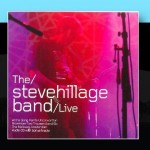
Jeff Moehlis: I’ve been enjoying your new release The Steve Hillage Band Live, recorded in 2006. What made that the right time to return to live performance of your 1970’s solo work?
Steve Hillage: Well, we had an opportunity. The Unconventions were a series of events that started just with the Gong fans in the early parts of last decade. And then they gradually progressed, and in the 2005 one we came and we played a set with our dance project, System 7. And various other Gong members were there. This was in Glastonbury, in the U.K. This was the year before the one in Amsterdam. Quite a lot of Gong members were there, original Gong members. Not Daevid Allen, but Gilli [Smyth] was there, and Didier Malherbe, and Tim Blake, and Mike Howlett. At the end of it we said, “Oh, let’s have a jam!” And so we had jam, and it was fantastic. So we decided we’d go for broke and do a really big Unconvention event in Amsterdam the following year.
Then I thought, well, because Mike Howlett played on Fish Rising, and the drummer of Gong, Chris Taylor, expressed an interest in doing some Steve Hillage tracks, we thought, let’s do a show of Steve Hillage Band sets as well. And this is the one that has been recorded and released on the DVD [and CD]. We just had an opportunity to do it. And it was interesting to do.
Then we did some further Steve Hillage Band sets as a support act for a Gong tour we did in 2009, a follow-through from the Unconvention event. But I will say that for these sets the Steve Hillage Band was basically connected umbilically to Gong, because we had Mike Howlett, the bass player of Gong, and Chris Taylor, the drummer of Gong, playing with myself and Miquette [Giraudy] and a couple of other guests.
If we do it again in the next year or two, it will be a different thing. It will be what we call a “stand-alone” Steve Hillage Band. So that’s an even more major enterprise that we’re considering possibly doing next year or in 2014.
JM: I know it’s premature, but do you think that would involve touring the U.S.?
SH: If someone wants to book us, yeah [laughs]. If no one books us, no. It’s as simple as that. I mean, if we decide to tour, we’ll play anywhere that we can put on a viable show. But someone’s got to book us. We can’t create concerts out of thin air.
JM: Your solo work has held up extremely well. What were your goals as back in the ’70’s as a solo artist, and do you think you achieved them?
SH: Well, I think the main goal was to create a sort of second-generation of psychedelic rock, you know, after the ’60’s which was when I grew up. That all went a bit pear shaped in ’69, ’70, with Altamont and everything, and then the death of [Jimi] Hendrix, who is my number one musical influence.
I was in a younger generation. We saw ourselves as a sort of second wave of psychedelic rock music. Gong was part of that as well. That was the main goal, I suppose – modern psychedelic rock music with a kind of tinge of spiritual philosophy idealism.
So, yeah, we definitely achieved all of that. In fact, we achieved it so much that by the time we got to 1980, we felt we’d kind of done it, you know?
JM: That was one of my questions. Why did you stop touring at the end of the ’70’s?
SH: Because we felt we’d sort of done what we had to do, and said what we wanted to say. We wanted to sort of find new areas of expressing ourselves – this is myself and my partner Miquette – musically. We were really tired of the rock band format, and we were aware of new developments in electronic sounds. We just watched the whole thing develop in the ’80’s while I was working extensively as a record producer.
In the ’80’s it was very different in the U.K. from America. In America you had the Deadhead scene that carried the whole psychedelic scene all right through into the ’90’s. In the U.K. in the ’80’s, psychedelic rock music kind of died out, more or less, and psychedelic culture, which was still there in terms of writing and poetry and art and general vibe, it actually sort of moved into the electronic music sphere in the mid-80’s, before the explosion of dance music. Dance music and psychedelic culture were wedded together in the ’80’s in the U.K., and it was a very obvious place for us to find ourselves.
This may be happening now [in America], you’ve got things like the Disco Biscuits, and the Camp Bisco Festival. But in the ’80’s this definitely wasn’t happening. A lot of people who liked psychedelic and progressive rock music, they hated techno and disco with a vengeance. Probably still do, actually.
JM: Is it fair to say that you see dance music as an evolution of psychedelic music, or is it a whole different beast?
SH: Since the 80’s, there’s been a psychedelic element in dance. But dance music has many things fused together to make it what it is – you know, funk, reggae, German music, all kinds of stuff.
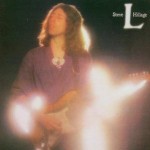
JM: You had mentioned that in the ’80’s you got into production. Going back to your solo albums, L – which I think is my favorite of your solo albums, incidentally – was produced by Todd Rundgren, and Green was co-produced by Nick Mason. What did you learn from them that you then could then apply to your own producing?
SH: A lot, actually, and I was aware at the time that it was a very useful experience to be produced by these illustrious gentlemen. Yeah, it was very useful for me. It gave me a unique set of experience.
Obviously when I’m on the other side of the glass, as they say, I can empathize with the musicians in a particular way.
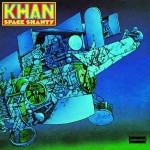
JM: Going way back, before your solo career, I think your first recording was Khan’s Space Shanty.
SH: Yeah, that was my first release as a professional musician. I would say that, in a way, it was almost like my first solo album. Because Fish Rising, in some respects, was like the second Khan album that never was. Some of that material, actually, I was working on before I joined Gong in 1972, ’73. I continued to work on it while I was in Gong. Interestingly enough, on the CD of the live recording that we’re releasing now, one of the bonus tracks is an early version of a Fish Rising track called Solar Musick Suite, actually performed with Gong in 1974. That’s what happened to Khan [laughs], it eventually became Fish Rising.
JM: To my ears Khan has a bit more of a progressive rock feel, on the Space Shanty album, that is. Whereas your later music was more Space Rock, or psychedelic.
SH: Yeah, that’s true. The Khan album I put together when I was in Canterbury, in Kent. I was in an environment of a music scene. I was working with people like Henry Cow and Caravan. Yeah, that was one of my musical roots. I did go more psychedelic [later]. Obviously the Gong influence was indelible, and remains so to this day.
JM: You also recorded with Kevin Ayers. It seems that Ayers is a huge talent who never quite got his due, never got the album sales that someone with his talent should’ve gotten. What is your take on Kevin Ayers?
SH: Well, I know Kevin very well. He’s another of the original Soft Machine members like Daevid Allen. He helped a lot in the early formation of Gong. He was part of the Gong family.
There’s maybe elements of his personal life that didn’t help him following through on his unique singing talent and his songwriting. But I enjoyed working with him. I’d known him since I’d been in Canterbury. In 1972, I was still just 21, I felt having my own project Khan had gotten to be a bit much for me. I thought it was too much pressure, and I wanted to play with other people. So I kind of put Khan on hold, before we got to recording the second album. And I also had an approach from this new record company, Virgin Records, to do a solo deal. That’s how eventually I got to do Fish Rising. This all happened before I joined Gong, actually. Gong was in fact one of the first Virgin Records signings, as was Mike Oldfield.
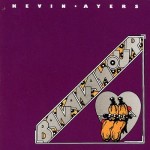
Now, Mike Oldfield was in in Kevin Ayers’ band. It was called Kevin Ayers and The Whole World, and he’d left the band because he wanted to do his solo projects, which started with his very successful Tubular Bells. So Kevin Ayers had no guitarist, and he said, “Would you like to work with me for a bit?”, you know, and I said, “Yeah.” And that gave me an opportunity to work with someone else. I recorded some tracks on his album Bananamour, and then we did about six weeks of touring. And that’s how I eventually ended up in France, and ended up moving from Kevin’s band to Gong.
JM: You mentioned Mike Oldfield, and you played on the live performances of Tubular Bells with Mike Oldfield. How did that come about, and what was that experience like?
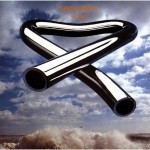
SH: When we were doing the Flying Teapot album with Gong at the Manor Studio, Richard Branson’s studio, we were sharing the studio with Mike, who was finishing Tubular Bells. When we were asleep he would come in and he’d work, and when he was asleep we’d go in and work. It was a 24/7 situation. So I got to know him then. And then later he invited me to play on his launch concert… I mean, we had no idea this was going to be so massive, you know? The launch concert was great. It was after the launch concert, we had the feeling it was going to do really well. I enjoyed working with Mike.
In fact, he had a bit of a sort of kind of breakdown a couple of years later, and he had a lot of concert orchestral gigs booked. He pulled out of them with short notice. Various other guitarists stepped in to deputize for him, and I deputized for him at a few concerts. The other guitarist who deputized for him was Andy Summers, later of The Police. Andy in fact has a connection with the Soft Machine. He played with the Soft Machine for a while. We’re one big family, you know? [laughs]
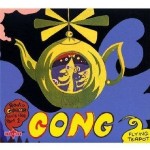
JM: I’m a huge fan of Gong’s Radio Gnome triology, and Flying Teapot [Volume 1 of the trilogy] is one of my favorite albums of all time. How would you describe the magic chemistry that came together to make those albums so good?
SH: Oh, it was absolutely an unforgettable, brilliant, but chaotic roller coaster ride. It was a brilliant combination of people we had at that time in Gong. Strong personalities – that’s why the thing was inherently unstable – with the unique talents of Daevid and Gilli, as the sort of founding members, plus craziness of the Gong mythology.
It was really like the ultimate psychedelic band. I mean, it was fantastic. I have great memories of that time.
JM: Obviously the musicianship is great, but the songwriting as well. It just came together.
SH: I can’t think of any other psychedelic rock band from the ’70’s that had quite the same level of funk and jazz musicianship, as well as all the space, and the craziness, and the humor, and the poetry – all these elements all mixed together – and the artwork. It was a total package.
We were conscious of it at the time. We felt we were doing something really pretty amazing, you know? We were digging it. It was exhilarating. But, as I said, like many good things, it was not to last.
JM: I understand there was a bit of turmoil. Are you willing to share some of the good and the bad times of that era?
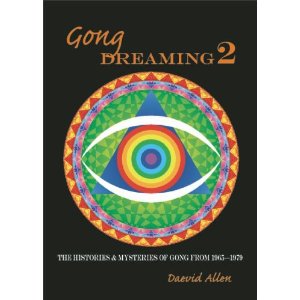
SH: Well, you’ll find a lot of it in Daevid Allen’s books. He’s got these two books, one called Gong Dreaming 1 and Gong Dreaming 2. They’re the reference works. I can’t really say that much apart from the fact that it was chaotic and exhilarating.
It was a great pleasure to get back with most people again at the Uncon, and then on the tour we did in 2009 and 2010. I mean, that’s kind of run its course now. I’m not so involved with Gong right now, but it was great to get back together again. It was a very pure moment. Unfortunately we couldn’t share it with everybody because some key members, notably Pierre Moerlen, the drummer, was no longer with us, unfortunately.
JM: So you don’t have any plans yourself to be involved with Gong, either an album or a tour?
SH: Well, we did the Uncon, we did the 2032 album that came out in 2009, a new album. We did the big tour in 2009, smaller tour in 2010. But this year Daevid’s taken Gong in a different direction, and its not a direction I can really follow. But they are touring. There’s a Gong tour this autumn in Europe, a big one.
JM: What advice would you give to an aspiring musician?
SH: There’s the great advice that actually Jimi Hendrix told Daevid Allen in the toilet of a club once in 1967. And he said, “Stay with your thing, man!” Basically, you’ve just got to stay with your thing. You’ve got to find a way of manifesting your individuality and your personality in what you do. Stick with it, and just develop your skills. That’s the essence of the whole thing. “Stay with your thing, man!” [laughs]
JM: You’ve touched on this a little bit already, but what are your plans, musical or otherwise, for the near future?
SH: We’re doing more System 7 material. We’ve just got a new EP coming out called Passion, on our label A-Wave, which is connected to the label that we used to release the Steve Hillage Band thing, which is G-Wave.
We’ve also got a very interesting project with a Japanese band, because we work a lot in Japan with System 7. They’re a Japanese live rock / psychedelic jam band called Rovo. They’re quite big in Japan. We’ve known these guys, particularly their electric violinist, for about ten years. And we ended up doing a tour last year where we did a collaboration set where they did some live band versions of some System 7 material, and we did System 7 versions, with a techno beat, of some of their material, and then we morphed from one to the other. It was very interesting. I don’t quite know any other project that so completely fused live band and techno music. It was very interesting to me because in one project it combined my work as a techno producer and as a lead guitar player. The project’s called Phoenix Rising. It had a particular resonance in Japan, because the phoenix is an important image in Japanese mythology. They’ve got the Asian equivalent of the phoenix. And, of course, after all the problems in Japan with the earthquake, the tsunami, and of course the terrible ongoing nuclear disaster, there’s a great need for Japan to get a grip and revive its morale. Phoenix Rising was a good symbol for that. The tour we did was very successful – it was last November. So we decided to do an album. Now we’re going to do a Phoenix Rising album to be released in Japan and the rest of the world. We will release the rest-of-the-world version on our label G-Wave. We’re going there in September to record the Phoenix Rising album, and then we’re hoping to do a major tour with this, second half of 2013. That would be something that we’d love to come to America and do. It’s a very interesting project.
JM: That’d be great. I’m based in California. I’d be very happy to see you in any incarnation.
SH: Yeah, we’d love to. Get your local promoter to send us an email. We’ll try to work something out – that’s all I can say.
JM: Do you want to set the record straight on anything regarding your music, your career, some misconception floating around?
SH: There are a couple of misconceptions. I’ll talk of two. There’s many, but I’ll talk of two.
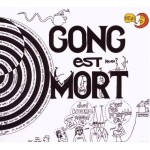
One, there was a reformed Gong for one concert, a live show in 1977. That was released on an album called Gong Est Mort, in French – it was in Paris. Gong Est Mort, Gong Is Dead. On the cover on that, my face is whited out, and some people think it’s because I had some apocalyptic falling out with Daevid Allen and the rest of the guys. That’s not true. That is not true. It was just purely because of a contractual dispute between Virgin Records, to which I was signed, and a French record label which Gong was originally signed to, which wanted to put out this live recording. I insisted on doing the show. Richard Branson didn’t want me to do the show, and I said I had to do the show. There were some personal reasons why I had to do it, because we owed some money to a guy in France who had had a lot of problems, and this concert was a way of paying him back. I had a personal debt to this guy. I felt absolutely honor-bound to do the concert, and I enjoyed it. So I did it whole-heartedly. But unfortunately they whited my face out purely for record company bullshit contractual reasons. That’s one misconception.
Secondly, some people think our System 7 project in America was called 777 for a while because we had a dispute with Apple about their operating system. That is not true. The reason we couldn’t call ourselves System 7 for a few years – because there was another band called System 7. It was resolved later, in the 90’s, and now we’re System 7 universally. Although we didn’t mind people thinking that Apple was the reason [laughs], we thought it was kind of cool, kind of interesting. We actually thought of the name System 7 before Apple came up with Operating Sytem Version 7. It’s a coincidence. A nice coincidence, because we’re fans of Apple, so that’s OK.
JM: Where am I reaching you at?
SH: Notting Hill, London. Where I’m trying to hide from the Olympic Games.
JM: Are you looking forward to the Olympics?
SH: No, because it’s going to cause chaos and confusion. I mean, where they made the Olympic Stadium and Olympic Park is quite near where I grew up, and it was a very, very poor area. So I think there will be a lot of long-term economic benefits from the games. So it’s OK, but I don’t like all the patriotism, I don’t like all the people screaming about medals, and I don’t like the rather paranoid atmosphere with lots of soldiers on the streets. They’re all worried about terror attacks. And also, they’ve blocked a lot of the roads off so only Olympic traffic can use it, so there’s traffic chaos. We call them the ZiL lanes. Like they had these roads in Communist Russia where only the party leaders could use them. They’ve got the ZiL lanes in London.
I’m reminded of a very funny, a very special Woody Allen quote. He said, “It’s not that I’m scared of death. I just don’t want to be around when it happens.” And I say, “I don’t really mind the Olympics, I just don’t want to be around when they happen.” Unfortunately I have to be around, because I’ve got some work to do in the city. I’ll be hiding in the studio. [laughs]
Actually it’s OK, because where we are in Notting Hill is West London, and the Olympic Games are in East London. All the action’s in East London. It’s quite quiet over here in West London, apart from the road to the airport, which is a nightmare. But if you keep away from that, it’s not too bad.
JM: Thanks for taking the time to talk to me. And enjoy the Olympics, or enjoy avoiding the Olympics.
SH: Yeah, sure.

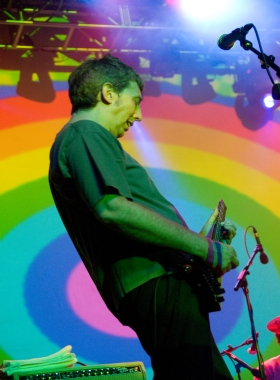
Discussion
No comments for “Interview: Steve Hillage”